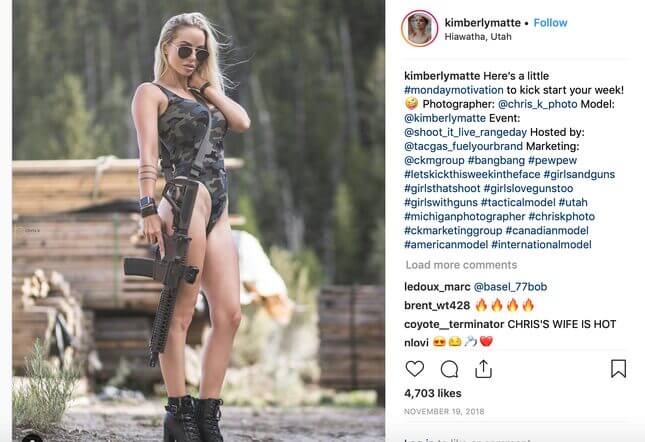‘Gun Bunny’ Instagram Influencers Hide Behind New Wave Feminism
As we know, strange communities are rampant on Instagram.
In Depth

This morning, Vox published a lengthy read on the firearm retailers taking over far-right Instagram spaces by using attractive young women to pose with their guns in sponsored posts. As we know, strange communities are rampant on Instagram: off the top of my head, we have InfoWars-branded supplements, luxury pet chicken diapers, vitamin vapes, Instagram witches, and kidfluencers making millions opening toys. Despite this, nothing feels more insidious than the women in American flag bikinis using loopholes in Instagram regulation to sell assault rifles through their social media feeds.
In the Vox profile, writer Kaitlyn Tiffany spoke to several “micro-influencers” like Kimberly Matte, an army wife with 84,000 followers. Others, like Liberte Austin and Lauren Young, have 200,000 followers each. While both sets of women have proportionally smaller followings than your run-of-the-mill Olivia Jade (1.2 million), corporations find such “micro-influencers” useful, as the Verge reported in April, to reach “tight-knit communities that trust their taste.” Tiffany writes:
“It just kind of blew up,” Young says of her account. “I think I fell into [the tactical] niche at the right time before it got oversaturated like it has with the fitness industry, or the Fashion Nova-type industry. I was getting reached out to by companies whose guns I’d shot. I think organically it became a bigger part of my life — more than I expected, for sure.”
Young mentions that she’d previously shot the guns of these various companies before being sponsored by them on Instagram, and it turns out she had joined the Army after high school. In 2016, she told Ballistic Magazine:
Ballistic could be a magazine devoted solely to image, to guns that look cool in studio lighting and do X, Y and Z until they actually hit the range. Every photo could potentially be an attractive somebody holding such a wonder weapon. These magazines exist, and believe us, they do really well on newsstands and online. Even Instagram has become cluttered with models holding new firearms and racking up likes and followers. But as we said, Young is different. She isn’t what’s become known as a “gun bunny.” Far from it. She’s the real McCoy, and that’s why we at Ballistic knew we had to bring her to your attention.
Later, the Ballistic interview reveals that Young toured in Afghanistan; in that piece, she thanked the Army for giving her the chance to shoot “many weapons,” making it hard for her to “pick a favorite” and, at one point, she cited the “terrorists” whose town she invaded at some point in 2012. Several other women in the Vox story say they’re married to retired veterans.
-

-

-

-

-

-

-

-

-

-

-

-

-

-

-

-

-

-

-

-

-

-

-

-

-

-

-

-

-

-

-

-

-

-

-

-

-

-

-

-








































